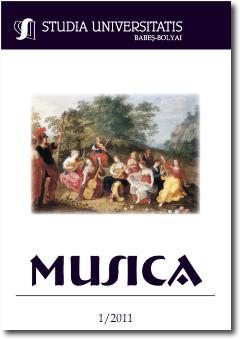AESTHETIC TRENDS AND DEVELOPMENTS IN BESSARABIAN OPERA MUSIC OF 20th CENTURY
Keywords:
music, opera, bessarabian composers, opera music of 20th century, aesthetic trendsAbstract
The opera in Bessarabia displays a wide range of concepts, styles and techniques. Thus, the composition spectrum in Bessarabia tackles various coordinates for the structuring of aesthetic concepts. The work of Bessarabian composers (the lyric genre) convincingly illustrates the interdependence between trends, which forms a heterogeneous aesthetic musical field. The composers’ interest constantly lies in musical sources of folk origin. The musical discourse comes into being under the influence of folk melodies, which imprints a variational character on the sound developments, facilitated by the episodic repetitions of the form of rondo (D. Gherschfeld, Zlata Tkach), as well as an improvisational character (Gh. Mustea).Folklore is the groundwork underlying the formation of the lyric genre in Bessarabia. The Bessarabian composers attempt to create musical value from the very substance of Romanian folklore. In addition to the „folkloric source“and/or the phonetic basis of folklore, these composers’ language also encompasses heterogeneous elements. Essentially, opera in Bessarabia presents the attributes of a heterogeneous, mixed language, integrating the traditional resources of Romanian folklore into the dynamic reality of European music aesthetics, but also retaining important influences from the Russian epic opera music (M. Mussorgsky, N. Rimsky-Korsakov) as well as from the former Soviet music (D. Shostakovich, S. Prokofiev).
References
*** Compozitori şi muzicologi din Moldova (Composers and Musicologists from Moldova), Bibliographic lexicon conceived by: Gleb Ceaicovschi-Mereşanu, Universitas Printing House, Chişinău, 1992.
Abramov, Elena, O nouă operă naţională (The Origins of... A new national opera), in: Universul muzical Magazine, issue no. 1, a publication of the Union of Musicians from the Republic of Moldova, Chişinău, 2002.
Anghel Irinel, Orientări, direcţii, curente ale muzicii româneşti din a doua jumătate a sec. XX (Directions and Trends in Romanian Music in the Second Half of the 20th century), Editura Muzicală Printing House of the Union of Composers and Musicologists from Romania, Bucharest, 1997.
Bartók, Béla, Însemnări asupra cântecului popular (Notes on the Folk Song), Editura pentru literatură şi artă Printing House, Bucharest, 1956.
Beilina, A., Opernoe tvorcestvo moldavskih kompozitorov (The Creation of Opera by Moldavian Composers), Muzâkal`naia kultura Sovetskoi Moldavii Printing House, M., 1965.
Beilina, A., Serdţe Domniki – opera A. Stârci (Domnica’s Heart – An opera by A. Stârch), in: Sovetskaia Moldavia, 22 May 1960.
Benghelsdorf, S., Sţeniceskoie voploşenie moldavskih naţional`nâh oper (The Stage Embodiment of National Moldavian Operas), at Rampa Printing House, 1973/74, K., 1976.
Blaga, Lucian, Trilogia Cosmologică: Diferenţele divine. Aspecte antropologice. Fiinţa istorică (The Cosmologic Trilogy: The Divine Differences. Anthropological Aspects. The Historical Being), Humanitas Printing House, Bucharest, 1997.
Buzilă, Serafim, Enciclopedia interpreţilor din Moldova (Encyclopedia of Moldova’s Interpreters), Second edition (Revised), ARC Printing House, Museum Printing House, Chişinău, 1999.
Cocearova, Galina, Sud`ba i tvorcestvo (Zlata Tcach: Destiny and Creation), Pontos, Chişinău, 2000.
Cosma, Octavian Lazăr, Hronicul muzicii româneşti (The Chronicle of Romanian Music), vol. I-VIII, Editura Muzicala Printing House, Bucharest, 1973-1988.
Cosma, Octavian Lazăr, Opera românească (The Romanian Opera), vol. I-II, Editura Muzicală a Uniunii Compozitorilor (Printing House of the Union of Composers and Musicologists from Romania), Bucharest, 1962.
Călinescu, George, Impresii asupra literaturii spaniole (Notes on Spanish Literature), Editura pentru Literatură Universală Printing House, Bucharest, 1965.
Guţanu, Luminiţa, O nouă operă naţională (A New National Opera), Literatura şi Arta Printing House, Chişinău, 21 November 2002.
Guţanu, Luminiţa, Opera Decebal de Teodor Zgureanu – un mod de abordare a genului liric la început de mileniu (Decebal - Opera by Teodor Zgureanu – An approach to the lyrical genre at the beginning of the millennium), Literatura şi Arta Printing House, May, 2002.
Zgureanu, Teodor, Decebal, Reduction for piano and Score, manuscript, 1998 and 1999.
Downloads
Published
How to Cite
Issue
Section
License
Copyright (c) 2011 Studia Universitatis Babeș-Bolyai Musica

This work is licensed under a Creative Commons Attribution-NonCommercial-NoDerivatives 4.0 International License.



